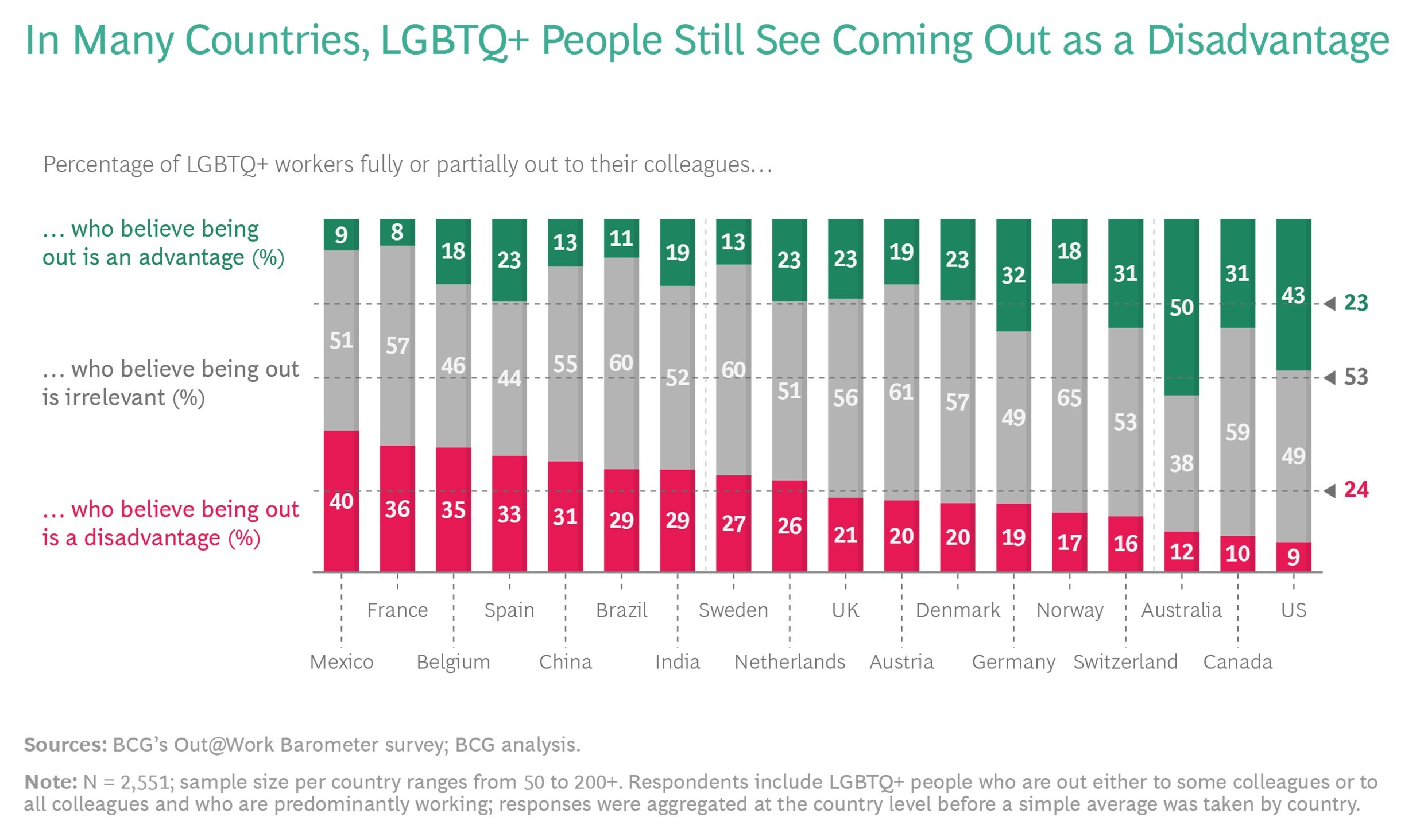The first year of employment is critical for LGBTQ+ employees, with the vast majority coming out then or likely not at all, according to a new survey and article by Boston Consulting Group (BCG). That conclusion has major implications for companies, as employees who feel comfortable sharing their identity at work are more empowered. The article, titled “Why the First Year Matters for LGBTQ+ Employees,” is being released today. It highlights the findings of the Out@Work Barometer, a global survey of about 8,800 people in 19 countries.
Overall, 70% of LGBTQ+ respondents said that they came out during the hiring process or within their first 12 months of starting their job. Just 10% came out after the first year, and the remaining 20% stayed closeted, underscoring how important it is for companies to create inclusive cultures from day one for all employees.
“Our survey found that LGBTQ+ employees who are out at work are more empowered and feel more comfortable about speaking up, being themselves, and building close friendships at the office,” said Gabrielle Novacek, a BCG managing director and partner and a coauthor of the article. “We believe that this in turn leads to more productive teaming and reduced employee turnover.”
Notable Geographic Variations
Although on average nearly a quarter (24%) of LGBTQ+ people surveyed across all countries believe that being out at work is an advantage professionally and 53% see it as a neutral factor, nearly a quarter (23%) see coming out as a disadvantage in the workplace, with many worrying that doing so is a potential risk to their careers.
Further, there are striking variations across countries. (See Exhibit.) In Australia, for instance, 50% of LGBTQ+ respondents see being out at work as an advantage, as do 43% of respondents in the US. In contrast, 40% of LGBTQ+ respondents in Mexico and 36% in France see coming out as a disadvantage to their careers.

Further Challenges for Groups Within the LGBTQ+ Community
The survey findings also shed light on the challenges that trans and gender nonconforming (TGNC) employees and LBTQ+ women face when making choices about being out at work. For instance, 74% of TGNC respondents reported instances of discrimination versus 57% of LGBQ+ respondents. And LBTQ+ women who are out reported a 13% greater incidence of sexual harassment than did their male counterparts.
Walking the Walk
Providing an environment in which LGBTQ+ employees feel comfortable bringing their authentic selves to work from day one is not a simple matter of rolling out a multitude of new initiatives. Companies need to develop a holistic plan to ensure that all stages of an employee’s journey during the first critical year reflect and are shaped by a diverse, equitable, and inclusive culture.
The article outlines concrete actions that companies can take across the employee life cycle to encourage employees to be comfortable being out. These include:
- Foundation. Ensure that the right HR policies and supportive infrastructure are in place and are communicated effectively.
- Recruiting. Focus on building a truly diverse workforce, including making targeted outreach to LGBTQ+ candidates and giving them support throughout the process.
- Onboarding. Immediately connect LGBTQ+ employees with mentors who can help them navigate their careers and be a resource in managing any concerns or issues.
- Day-to-Day Work Environment. Create a respectful, inclusive culture, with a structured program in place for allies that offers, among other things, sensitization training on diversity, equity, and inclusion.
- Continued Engagement. Include regular and frequent expressions of support for, celebrations of, and events that recognize the Pride movement, and support broader LGBTQ+ rights and inclusion as a regular component of the company’s calendar.
“The good news is that companies can help ensure that employees feel comfortable bringing their authentic selves to work from day one,” said Elliot Vaughn, a BCG managing director and senior partner, the global leader of Pride@BCG—the firm’s network for LGBTQ+ colleagues and allies—and a coauthor of the article. “The key is to foster diversity, equity, and inclusion at all stages of the employee journey. These actions signal that the company is actually ‘walking the walk’ when it comes to building an inclusive culture.”





